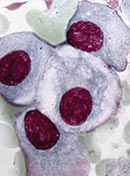|
NEW! Follow us on
 
Advertisement

|
 |
| Editor's Notebook |
Will Pharmacists Fuel Biosimilars?
Pharmacists can build patient confidence about biosimilars, promoting access to more economical treatment. |
 |
| Counseling Pearls |
 Biosimilars: Current Approvals and Pipeline Agents Biosimilars: Current Approvals and Pipeline Agents
Only four biosimilars (Zarxio, Inflectra, Erelzi, Amjevita) have been approved in the U.S., but many other agents are in development. Pharmacists can facilitate use by engaging with prescribers, patients, insurance companies, and the FDA. |
 Pseudofolliculitis Barbae: Prevention and Treatment Pseudofolliculitis Barbae: Prevention and Treatment
This common inflammatory skin condition occurs as a result of shaving, mainly in men of African descent. Because infected males are often asymptomatic, they may go undiagnosed, making prevention crucial in high-risk populations. |
| |
| It's the Law |
Lethal High: Acetyl Fentanyl
New psychoactive substances pose significant regulatory challenges at federal and state levels. |
| |
| Clinical Corner |
 New Therapies Approved for Multiple Myeloma New Therapies Approved for Multiple Myeloma
Although multiple myeloma is incurable, the last two decades have seen great progress in understanding its biology and treatment. Recent advances have led to increased drug development, including four novel agents approved in 2015. |
 Medication Therapy Management in Hospitalized Elderly Patients: A Focus on OTC Agents Medication Therapy Management in Hospitalized Elderly Patients: A Focus on OTC Agents
Despite widespread use, many patients and healthcare professionals are not fully aware of the potential adverse events associated with OTC drugs. Elderly patients are more susceptible to adverse drug events compared with the general population. |
| |
| TrendWatch |
Approval of Novel Drugs in 2015
Twenty-one novel drugs—a record number—were approved to treat rare or orphan diseases last year. |
| |
| Educational Spotlight |
Zika Virus and Its Effects in Pregnancy
Patient counseling and education are essential for successfully managing the current outbreak. |
A Review of the Management of Nephrolithiasis
For patients with recurrent kidney stones despite adequate fluid intake, pharmacologic treatment is recommended to prevent formation. |
Pulmonary Embolism Prevention and Treatment Update
Novel oral anticoagulant agents are a major addition to the CHEST antithrombotic guidelines. |
| |
|
 |
| Newswire |
 |
ADT for Prostate Cancer Linked to Dementia
Stanford, CA—
A retrospective study conducted at the Stanford University School of Medicine suggests that prostate cancer patients who are treated with androgen-deprivation therapy (ADT) are twice as likely as those who are not treated with these testosterone-lowering drugs to develop dementia within 5 years. Clinical data from Stanford on nearly 10,000 patients with prostate cancer were examined, and 7.9% of the 1,829 patients who received ADT developed dementia within 5 years, versus 3.5% of patients not treated with ADT. The investigators stated that alternative treatment is worth considering depending on a patient's dementia history and that prostate cancer patients receiving ADT should not alter their medications without speaking with their physicians. |
 |
Hot Flashes in Menopause May Have Genetic Component
Los Angeles, CA—
Fourteen dozen common gene variants that appear to have robust links to menopausal hot flashes have been discovered by researchers at the University of California–Los Angeles. These gene variants affect a receptor (tachykinin receptor 3) in the brain that controls the release of estrogen and is present in women of all ethnicities. Women's Health Initiative data (11 million single-nucleotide polymorphisms, as well as patients' reports about hot flashes and night sweats) from 17,695 postmenopausal women aged 50 to 79 years were examined. Women with these variants were more likely than those without them to have hot flashes, and the genetic links persisted after other factors influencing hot flashes were accounted for. |
 |
Calcium Supplements Could Damage Heart
Baltimore, MD—
After analyzing 10 years of medical tests and questionnaire data in >2,700 participants in a long-running multiethnic study of atherosclerosis, researchers at Johns Hopkins Medicine and other institutions have concluded that taking calcium supplements may raise the risk of arterial-plaque buildup and heart damage. Participants were aged 45 to 84 years, and 51% were female. Supplement-takers had a 22% increased likelihood of an increase >0 in their coronary artery calcium test scores over the decade, but participants with the highest dietary calcium intake (>1,022 mg/day) exhibited no increased risk of developing heart disease over this period. The researchers note that their findings merely document an association between calcium supplements and atherosclerosis and do not prove cause and effect. |
 |
|
   |
| To subscribe to U.S. Pharmacist eFLASH, send your name, address, and email address to us by clicking here.
U.S. Pharmacist is a monthly journal dedicated to providing the nation's pharmacists with up-to-date, authoritative, peer-reviewed clinical articles relevant to contemporary pharmacy practice in a variety of settings, including community pharmacy, hospitals, managed also useful to pharmacy technicians, students, other health professionals and individuals interested in health management. Pharmacists licensed in the U.S. can earn Continuing Education credits through Postgraduate Healthcare Education, LLC, accredited by the Accreditation Council for Pharmacy Education (ACPE) as a provider of continuing pharmacy education. |
|
|